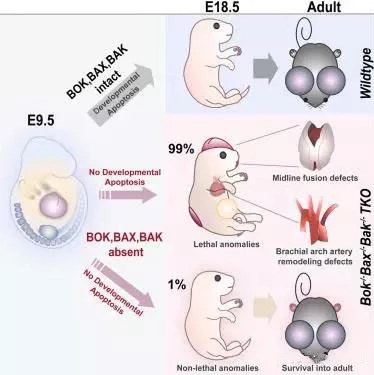Study found that protein BOK plays an important role in apoptosis

Study found that protein BOK plays an important role in apoptosis

Copyright © iCell Bioscience Inc, Shanghai 2018-2019
Programmed cell death, also known as apoptosis, is a normal process that removes diseased, damaged or unwanted cells in the body in a controlled manner to limit side effects and damage to the body.
In the 1940s, apoptosis was first described as playing a role in embryonic development. Over the past 70 years, many studies have suggested that apoptosis plays a key role in most stages and tissues during development.
In a new study, Australian researchers confirmed that while apoptosis is essential for healthy development as a whole, many organs and tissues do not require apoptosis to develop normally. It is clear that apoptosis is not as important as previously thought during development.

This finding may rewrite our understanding of the role of apoptosis in embryonic development and congenital birth defects. This also suggests that abnormalities in cell death may lead to some common human birth defects such as spina bifida, cardiovascular vascular defects and cleft palate.
These researchers found that apoptosis is essential at specific times and locations during development but is not necessary at other times and locations during development. Tissues and organs that specifically required apoptosis to develop normally were identified, and surprisingly, the researchers also identified that many tissues and organs do not need apoptosis at all during development.
In order to determine the role of apoptosis in development, these researchers eliminated the pro-apoptotic proteins BAK, BAX and a similar protein BOK, in which the function of protein BOK is still unknown. It was confirmed that their protein BOK is also a pro-apoptotic protein.
In this study, the researchers used the Australian synchrotron to resolve the structure of protein BOK and once and for all confirmed that as a pro-apoptotic protein, protein BOK plays an important role in apoptosis.
 Loading ....
Loading ....
